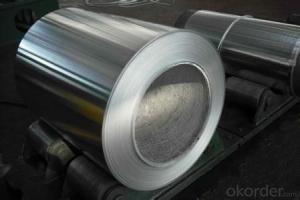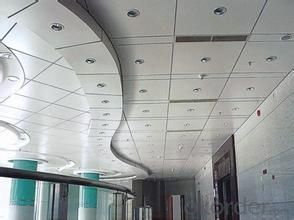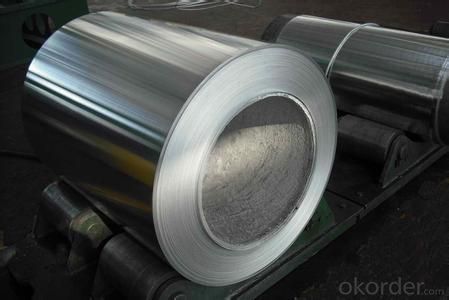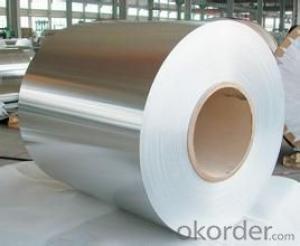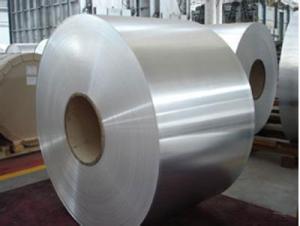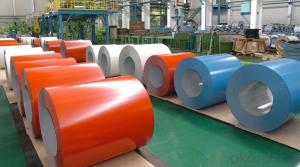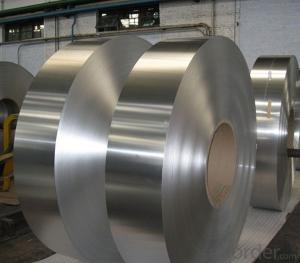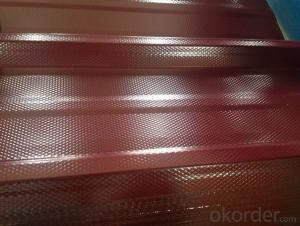3X Aluminum Coil for Roofing
- Loading Port:
- China Main Port
- Payment Terms:
- TT OR LC
- Min Order Qty:
- -
- Supply Capability:
- -
OKorder Service Pledge
OKorder Financial Service
You Might Also Like
Aluminium is a relatively soft, durable, lightweight, ductileand malleablemetalwith appearance ranging from silvery to dull gray, depending on the surfaceroughness. It is nonmagnetic and does not easily ignite. A fresh film ofaluminium serves as a good reflector (approximately 92%) of visible lightand an excellent reflector (as much as 98%) of medium and far infraredradiation. The yield strength of pure aluminium is 7–11 MPa,while aluminium alloys have yield strengths ranging from200 MPa to 600 MPa. Aluminium has about one-third the densityand stiffness of steel. It is easily machined,cast, drawn and extruded.
Aluminium alloys (or aluminum alloys; see spellingdifferences) are alloysin which aluminium(Al) is the predominant metal. The typical alloying elements are copper, magnesium,manganese,silicon,tin and zinc. There are twoprincipal classifications, namely casting alloys and wrought alloys, both of which are furthersubdivided into the categories heat-treatableand non-heat-treatable. About 85% of aluminium is used for wrought products,for example rolled plate, foils and extrusions.Cast aluminium alloys yield cost-effective products due to the low meltingpoint, although they generally have lower tensile strengthsthan wrought alloys. The most important cast aluminium alloy system is Al–Si,where the high levels of silicon (4.0–13%) contribute to give good castingcharacteristics. Aluminium alloys are widely used in engineering structures andcomponents where light weight or corrosion resistance is required
Specification:
Alloy: AA1050, 1060, 1100,AA3003, 3005, 3015, 5052, 5754, 5083,8011, etc
Temper:H14/16/18/22/24/32, HO etc.
Thickness:0.2mm—100mm
Width: 100mm—2300mm (Can be slitted)
InnerDiameter: 508MM
Coil Weight:500kg-3000kg(Max.)
Application:Foil stock, Circles, Roofing, Can stock, Marine plate,Anti-slipery purpose in vehicles, packing and appliance.
Features:
1. Excellent quality of products
2. Quick delivery
3. Best service to clients
4. BV,SGS avalible
5. No buckle o waveness
6. Tension leveling
7. Certificate of Origin
8. Form A,E
Packaging Detail:
Carton ,Woodenpallet with plastic protection packing ,standard seaworthy packing or as yourrequest.
ProductionCapacity:
AnnualProduction capacity of 600,000 tons.
Products areexported to United States, Canada, U.A.E, Brazil, Mexico,Thailand, Vietnam,Nigeria etc, over 100 countries andregions all over the world.
Production Line:
CNBM aluminumproduction base is comprised of 18 aluminumannealers, 10 coil and foilmills, 4 continuous production lines, 2hot rolling production line and 3prepainted lines.
FAQ:
1. What is the form of payment?
Normally 30% TT, L/C
2. Type of quotation?
FOB, CFR, CIF
3. Port of loading?
Shanghai port
4. Delivery time?
30 day after client’s deposit
- Q: Can aluminum coils be used in the manufacturing of automotive wheels?
- Yes, aluminum coils can be used in the manufacturing of automotive wheels. Aluminum is a popular material choice for wheels due to its lightweight and corrosion-resistant properties. Aluminum coils can be shaped and formed into the desired wheel design, providing strength and durability while reducing the overall weight of the vehicle. Additionally, aluminum wheels offer enhanced heat dissipation, which can improve braking performance. Therefore, aluminum coils are a suitable option for the manufacturing of automotive wheels.
- Q: What are the common alloys used in aluminum coil production?
- The common alloys used in aluminum coil production are 3003, 3105, 5052, and 6061.
- Q: Explain how aluminum coils function to shield against electromagnetic interference.
- <p>Aluminum coils protect against electromagnetic interference (EMI) through a process known as electromagnetic shielding. Aluminum, being a conductive material, can reflect and absorb EMI, preventing it from penetrating the protected area. When an aluminum coil is used as a shield, it creates an electric field that interacts with the EMI, either reflecting the interference back or absorbing it, thus reducing its impact on sensitive electronic equipment. The high conductivity of aluminum also allows it to distribute the EMI evenly across its surface, minimizing the effect of any single point of entry. This shielding is crucial in various applications, such as in electronic devices and communication systems, to ensure reliable performance and data integrity.</p>
- Q: Can aluminum coils be used in the production of consumer electronics?
- Yes, aluminum coils can be used in the production of consumer electronics. Aluminum coils are commonly used in various electronic devices, such as smartphones, laptops, and televisions, due to their lightweight, high conductivity, and thermal efficiency properties. They are used in components like heat sinks, connectors, and circuit boards to ensure efficient heat dissipation and electrical conductivity, thereby enhancing the performance and reliability of consumer electronics.
- Q: You guys may be thinking, why the hell i posted this in the computer section. Well, I'm opening my computer, and I hate the anti-static wristbands. I know that by touching metal, you can get rid of all static electricity in your hands. Can you do this by touching aluminum foil? Since it's something everyone should have in their house.. Can it work like this?
- Yes most kinds of metal would work.
- Q: aluminium plate - 1800mm x 950mm x 1.5mmprocesses - i) sandblasting ii) polyethylene coating iii) matt blastingWhy does aluminium plate warp after the first process?How to prevent warping? Other than increasing material thickness (weight issue)
- Cold rolled aluminium may get stress relieved by sand-blasting and thus get warped. Normally warping should not take place if sand blasting is done on both sides. Another potential reason could be lack of adequate support for the plate during blasting. Check out these factors and take corrective action.
- Q: Aluminium forms layer of aluminium oxide when exposed to air. This prevents further reaction.However, isn't aluminium oxide an amphoteric oxide that can react with both acids and alkalis?
- Like hell, it can.
- Q: I'm 14 an was told that aluminum free deodorant would stop yellow stains on my white shirts, so which female deodorant would help stop yellow stains
- Deodorant with aluminum also causes breast cancer. I use Toms of Maine deodorant, which is aluminum-free.
- Q: How do aluminum coils compare to zinc coils in terms of durability?
- The durability of aluminum coils and zinc coils is influenced by their different properties. Aluminum coils are highly durable due to their excellent corrosion resistance. They naturally develop an oxide layer that acts as a protective barrier against rust and degradation. This makes them ideal for use in coastal areas or locations with high humidity levels. In contrast, zinc coils, specifically galvanized steel coils, are coated with a layer of zinc to enhance their corrosion resistance. The zinc coating acts as a sacrificial layer, corroding first and protecting the underlying steel from rust. As a result, zinc coils are also highly durable and can withstand harsh conditions where the steel substrate is exposed to moisture or chemicals. Although both aluminum and zinc coils offer good durability, aluminum coils have an advantage in terms of corrosion resistance. Their natural oxide layer provides continuous protection, while zinc coils rely on the sacrificial zinc coating, which can gradually wear off over time. However, the overall durability of both types of coils depends on factors such as maintenance, usage, and the specific environment in which they are installed.
- Q: what is the most likely charge for aluminum cation?the answer is +3, but why? how can i figure this out with different ones?
- Aluminum has 3 valence electrons and it will try to get rid of these to end up with the outer valence shell being full. Electrons have a negative charge though, so getting rid of one brings the actual charge up, so it ends up +3.
Send your message to us
3X Aluminum Coil for Roofing
- Loading Port:
- China Main Port
- Payment Terms:
- TT OR LC
- Min Order Qty:
- -
- Supply Capability:
- -
OKorder Service Pledge
OKorder Financial Service
Similar products
Hot products
Hot Searches
Related keywords

